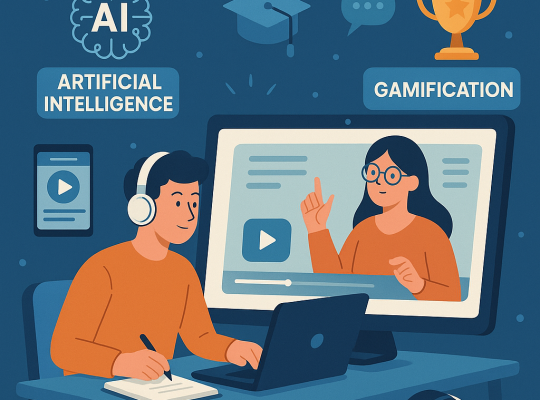Learning is not just a process confined to childhood; it’s a lifelong journey. Cultivating a love for learning, no matter your age, can open doors to personal growth, career advancement, and the joy of discovering new things. The truth is, learning doesn’t stop once you leave school or graduate from a course—there’s always something new to explore, understand, or master.
But what happens when the excitement of learning fades away, and you begin to dread the thought of studying or gaining new knowledge? Many people, especially adults, fall out of the habit of learning after formal education ends. However, the key to lifelong learning is not simply a matter of pushing yourself to learn but finding ways to reignite that spark of curiosity, no matter where you are in life.
In this article, we’ll explore strategies for cultivating a lifelong love of learning that will help you stay intellectually engaged and curious throughout your life.
The Importance of a Love for Learning
Before diving into strategies, let’s understand why cultivating a love for learning is so important.
-
Personal Growth: Learning helps us develop new skills, deepen our understanding of the world, and become more adaptable in the face of change.
-
Career Development: In today’s fast-paced world, learning new skills is essential to remain competitive. Lifelong learners are often better at adapting to new job roles and technologies.
-
Mental Stimulation: Continuous learning keeps the brain sharp. Research shows that lifelong learning can improve cognitive function and even delay the onset of neurodegenerative diseases such as Alzheimer’s.
-
Increased Confidence: The more you learn, the more confident you become in your abilities to tackle challenges, both personally and professionally.
-
Enhanced Creativity: Exposure to new ideas, concepts, and experiences stimulates creative thinking, allowing you to find innovative solutions to problems.
The ability to cultivate a love for learning is not just an academic pursuit but an essential tool for living a fulfilling, successful, and joyful life.
1. Embrace a Growth Mindset
One of the most powerful steps you can take to cultivate a love for learning at any age is to embrace a growth mindset. A growth mindset is the belief that your abilities and intelligence can be developed through hard work, dedication, and perseverance. It’s the opposite of a fixed mindset, which holds that your abilities are innate and unchangeable.
How to Foster a Growth Mindset:
-
Reframe Failure as a Learning Opportunity: Instead of seeing failure as something negative, view it as a valuable lesson. Understand that mistakes are part of the learning process, and each setback offers an opportunity for growth.
-
Celebrate Effort Over Outcome: Acknowledge the effort and hard work you put into learning, not just the results. This helps reinforce the idea that learning is a continuous process.
-
Encourage Curiosity: Ask questions, explore new topics, and allow your curiosity to drive your learning. When you’re genuinely curious, learning becomes an enjoyable journey.
By adopting a growth mindset, you’ll be more open to challenges and less likely to get discouraged when things get tough.
2. Set Realistic and Meaningful Learning Goals
Setting goals is a powerful way to keep you focused and motivated as you learn. However, it’s essential to set goals that are realistic, achievable, and most importantly, meaningful to you. Learning that is tied to personal interests or future aspirations tends to be more fulfilling and engaging.
How to Set Effective Learning Goals:
-
Make Them Specific: Instead of vague goals like “learn more,” aim for specific objectives, such as “learn how to speak conversational Spanish” or “finish reading one book per month.”
-
Break Them Down: Large goals can feel overwhelming. Break them down into smaller, manageable steps. For instance, if your goal is to master a new skill, focus on learning one concept at a time.
-
Track Progress: Celebrate small victories along the way. This helps maintain motivation and reinforces the idea that learning is a gradual process.
By setting clear and meaningful learning goals, you create a roadmap that helps you stay engaged and motivated, no matter your age.
3. Make Learning Fun and Interactive
Learning should never feel like a chore. Finding ways to make it fun and interactive can reignite your passion for acquiring knowledge. When you enjoy what you’re doing, learning feels less like an obligation and more like an exciting activity.
Fun Ways to Learn:
-
Engage in Online Courses or Workshops: Platforms like Coursera, Udemy, or MasterClass offer courses on a wide variety of topics, from photography to business management. These platforms make learning accessible, flexible, and fun.
-
Watch Documentaries and Educational Videos: Sometimes, the best way to learn about something new is by watching it unfold in front of you. Documentaries provide an engaging way to explore historical events, scientific discoveries, and different cultures.
-
Join Learning Communities or Book Clubs: Connecting with others who share similar learning interests can make the process more interactive and enjoyable. You can exchange ideas, ask questions, and build a network of like-minded individuals.
-
Gamify Learning: Many educational apps and tools use gamification to make learning fun. Language apps like Duolingo or trivia games can be a fun way to engage in learning without feeling overwhelmed.
The key to making learning enjoyable is to discover methods that match your personal learning style. The more enjoyable the process, the more likely you are to stick with it.
4. Find Your Passion and Pursue It
Lifelong learning becomes easier when you focus on subjects or skills that truly interest you. Everyone has something they are passionate about, and discovering what that is can provide endless motivation.
How to Find Your Passion:
-
Reflect on Your Interests: Think back to what excited you as a child. What activities or subjects sparked your curiosity? Revisiting these interests can help you uncover your passion.
-
Experiment with New Activities: Try new things that are outside of your usual routine. Take a cooking class, learn an instrument, or start a DIY project. You might find a hidden talent or interest.
-
Think About Your Long-Term Goals: Consider how learning a particular skill or subject might help you achieve your long-term goals, whether they’re personal or professional.
Once you identify what excites you, immerse yourself in it. Passion-driven learning is not only easier to maintain but also more fulfilling.
5. Create a Consistent Learning Schedule
In our fast-paced world, it’s easy to let learning fall by the wayside as we juggle work, family, and other commitments. However, consistency is key when it comes to building a habit of learning.
How to Make Time for Learning:
-
Carve Out Time Daily: Even 15–30 minutes of learning every day can add up to significant progress over time. Whether it’s reading a chapter of a book, watching an educational video, or listening to a podcast, consistency matters.
-
Schedule Learning Sessions: Just as you schedule meetings or appointments, allocate specific time slots for learning in your calendar.
-
Prioritize Learning: Make learning a priority by setting aside distractions during your learning sessions. This will help you stay focused and committed.
The more you make learning a part of your daily routine, the more natural and enjoyable it will become.
6. Teach Others What You Learn
One of the best ways to solidify what you’ve learned is to teach it to someone else. Teaching forces you to recall information, clarify concepts, and even identify gaps in your own understanding.
Benefits of Teaching Others:
-
Reinforces Your Knowledge: Explaining a concept to someone else helps reinforce your understanding and boosts retention.
-
Builds Confidence: Teaching others builds your confidence in your knowledge and skills.
-
Creates a Supportive Learning Environment: Teaching encourages collaboration and fosters a sense of community, which can make learning more enjoyable and meaningful.
Whether it’s tutoring a friend, presenting a topic at work, or starting a blog to share your knowledge, teaching is a powerful tool to enhance your love for learning.
7. Be Open to New Ideas and Perspectives
One of the most exciting aspects of lifelong learning is the opportunity to explore different perspectives. Whether through reading, traveling, or engaging in conversations, being open-minded allows you to grow intellectually and personally.
Ways to Stay Open to New Ideas:
-
Listen to Podcasts or Audiobooks: These can expose you to new ideas, authors, and experts in various fields.
-
Attend Workshops and Conferences: Networking with others in your field or related fields can open you up to new ways of thinking.
-
Embrace Cultural Exchange: Traveling or meeting people from different backgrounds can offer insights that enhance your learning.
Being open to new ideas keeps the learning process exciting and broadens your intellectual horizons.
8. Cultivate Patience and Persistence
Learning is not always easy, and sometimes it requires patience and persistence. You may encounter roadblocks, confusion, or frustration. However, maintaining a positive attitude and persevering through difficulties is a crucial part of the learning process.
How to Cultivate Patience:
-
Focus on Progress, Not Perfection: Remind yourself that learning is a journey, not a race. Celebrate your progress, even if it feels slow.
-
Stay Positive: Surround yourself with positivity and encourage a growth mindset. Embrace challenges as opportunities to grow.
The more patient and persistent you are, the more likely you are to develop a deep, lasting love for learning.
Conclusion: Never Stop Learning
Whether you’re in your twenties, forties, or beyond, it’s never too late to cultivate a love for learning. By embracing curiosity, setting goals, and finding joy in the process, you can reignite the passion for discovery that will keep you intellectually engaged for the rest of your life.
Learning is not a destination—it’s a lifelong journey. And the more you engage with it, the more enriching your life will become.



